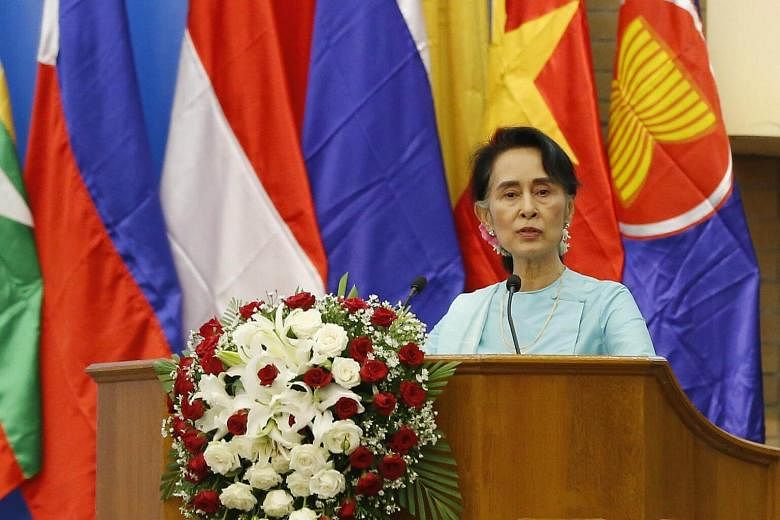In its editorial on Aug 29, the paper says Myanmar can hope to avoid a brutal conflict in Rakhine only by spurning military control.
BANGKOK (THE NATION/ASIA NEWS NETWORK) - Myanmar leader Aung San Suu Kyi's relative newness to governing is no excuse for failing to act swiftly to end the horrific conflict boiling over in western Rakhine state. The long political struggle she endured before coming to power should have taught her better than most that any military response to a political dispute is bound to fail or even worsen the situation.
In the early hours of last Friday, the Arakan Rohingya Salvation Army (ARSA) launched coordinated attacks on 30 police and army outposts in Rakhine. Equipped with homemade explosives, machetes and small arms, the militants attacked security forces in Maungdaw, Buthidaung and Rathedaung townships. The government said 10 police officers, a soldier and an Immigration official were killed in the assault. The swift response by the Tatmadaw - the armed forces - left at least 77 insurgents dead (and one in custody).
It would seem that the Tatmadaw took advantage of the situation to extend its "clearance" operations throughout the area. Clashes will continue and there is no end in sight to the communal strife between Muslims and Buddhists that has ignited violence repeatedly since 2012.
This was the second time ARSA had attacked government forces. The first incident, last October, also prompted a heavy-handed backlash from the Tatmadaw, a "clean-up" that drove 87,000 people into neighbouring Bangladesh, which is now forcing them back across the border. The problem's deep roots in prejudice against the Muslim Rohingya of Rakhine among Buddhists predate Suu Kyi's rise to power as head of the National League for Democracy (NLD).
But her government bears full responsibility for ending the conflict now. Its dilemma is that the Rohingya get no sympathy from the ruling elite, not even from key members of the NLD, and yet the international community is demanding a resolution. Former United Nations secretary general Kofi Annan last week submitted the report of a committee he led on exactly this issue, laying out clear recommendations to bring about resolution.
The Rohingya are not recognised as citizens, it noted, despite having lived there all their lives and having family roots dating back decades. To the Buddhist majority, they are Bengalis illegally living in Myanmar. Suu Kyi characterised Friday's attacks as an act of "terrorism" and urged news media to use the term "Bengali terrorists" rather than "Muslim insurgents". It was a reversal of her directive last year that, to avoid inflaming ethnic tensions, the stateless people of Rakhine should be referred to as "Muslims" rather than "Bengalis" or "Rohingyas".
The sharp edge of her dilemma is the Tatmadaw, which continues to wield substantial power despite having relinquished some of the reins of government in an election. The armed forces believe in taking an eye for an eye and a tooth for a tooth and will show the Rohingya militants no mercy.
Annan, a fellow Nobel Prize laureate of Suu Kyi, released his advisory committee's report just two days before Friday's bedlam. The government received it with gratitude. Some members of the government might well be willing to heed its recommendations and grant the Rohingya their overdue rights, enabling them to access medical care and other state services.
The Tatmadaw is unwilling to bend, however, and with the three ministries of Defence, Home Affairs, and Border Affairs under its control, it still has Suu Kyi on its reins, if not the government per se. She's going to have to reverse that situation now.
The Nation is a member of The Straits Times media partner Asia News Network, an alliance of 23 news media.

